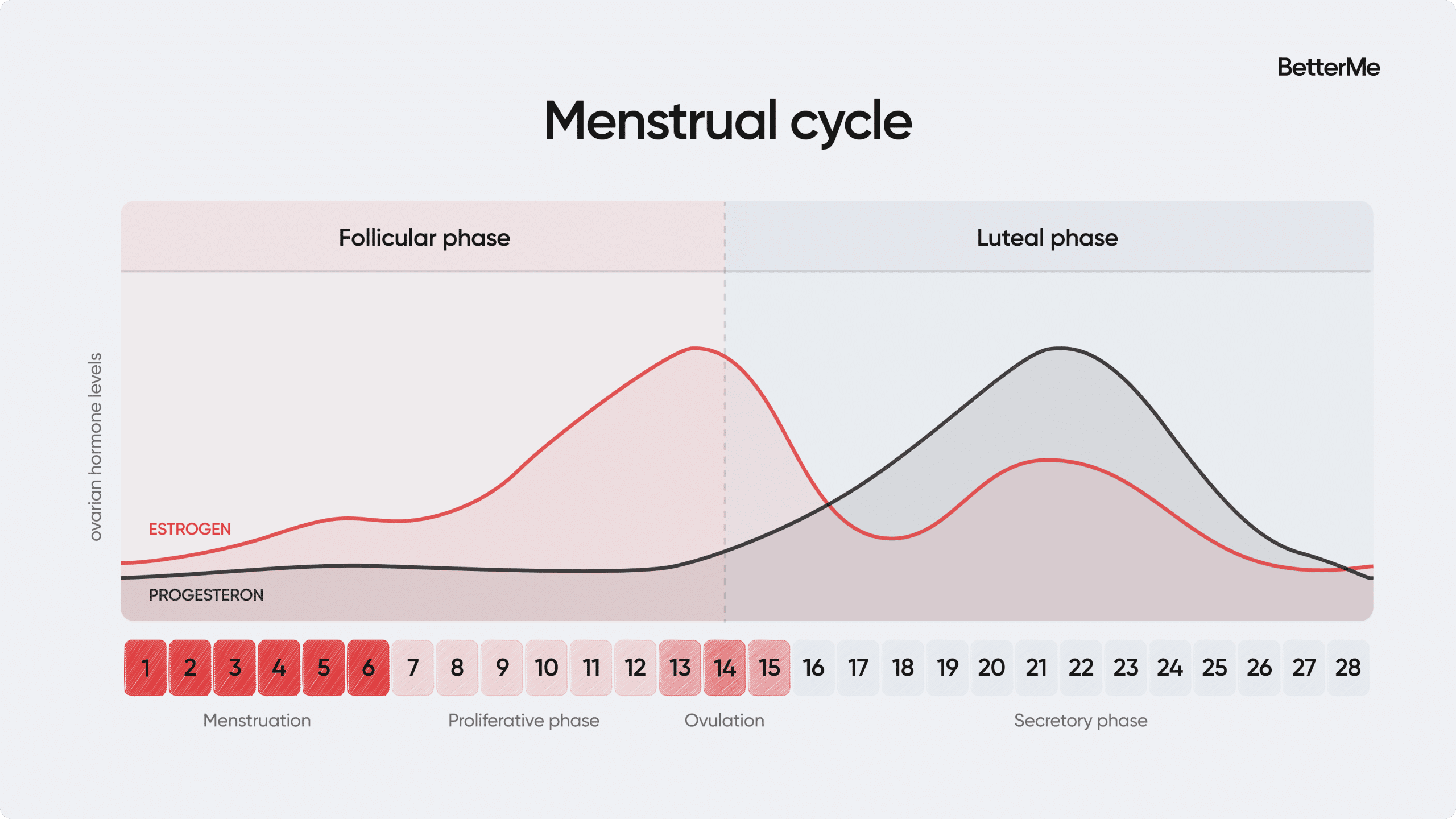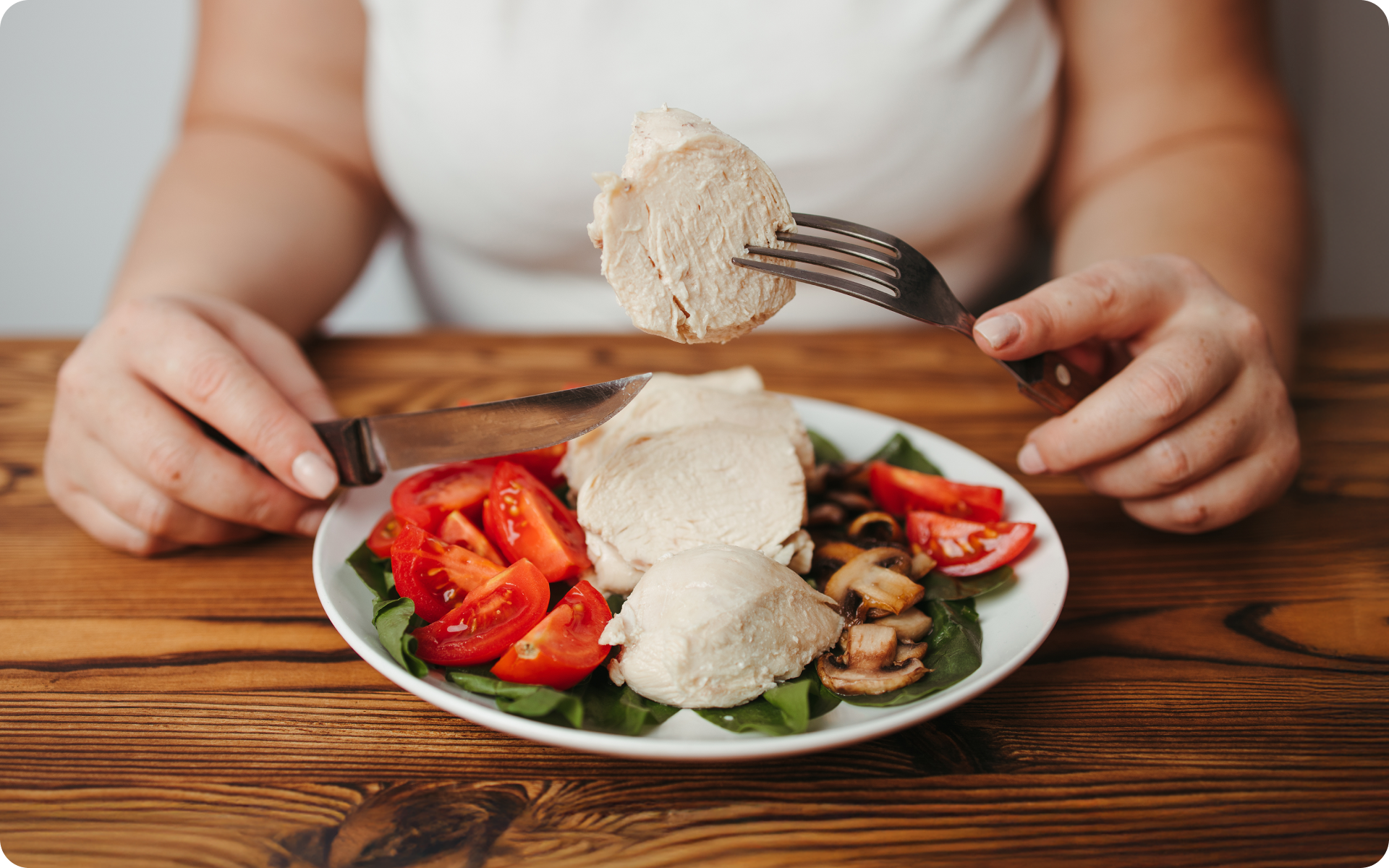There are various factors that influence your cycle such as age, obesity, and stress. However, one of the most influential is your dietary pattern. But how can changing your diet change your period? Join us as we look at the association between diet and sudden changes in menstrual length.
Before we explain if and how diet affects your menstrual cycle, let us first understand what an irregular cycle is and its effects. The length of the menstrual cycle for most women is 28 days on average, but this may vary among different women. Experts define a cycle as irregular if it lasts for more than 35 days or the duration varies (1).
To put it simply, an irregular cycle occurs when you don’t ovulate on day 14. When ovulation does not occur on day 14, the follicular phase of the menstrual cycle is extended causing the cycle length to be longer than 35 days.

Can Changing Your Diet Cause Your Period to Change?
The answer to this is yes. Usually, diet is a lesser culprit of an irregular cycle. Most people assume that it only affects period cramps and in a good way. The assumption is based on the fact that there are foods that may help with period cramps, such as salmon, beef, tofu, beans, and lentils (2).
Some drinks help with period cramps, the number one being water. Judging from this, you may assume that diet doesn’t influence your cycle length, but it can.
How Changing Your Diet Affects Your Period
Here are some of the ways changing your diet changes your period length:
Not getting enough calories interferes with producing the necessary hormones for ovulation (3). This leads to rapid or excessive weight loss that causes an irregular period or results in stopped periods (3).
Therefore, it’s important to always get enough calories and maintain a healthy weight to avoid changing your menstrual cycle length. Keep your body mass index (BMI) above 18.5. Anything lower than this shows you’re underweight and has a higher chance of affecting the length of your flow (4).
Two conditions that can result in low BMI are bulimia nervosa and anorexia nervosa. Bulimia nervosa is when an individual has periods of binge eating but soon after this they purge, often by vomiting or the use of laxatives (5).
Anorexia nervosa is a disorder where an individual avoids food or eats tiny quantities of specific foods (5). It is a severe disorder that has a higher death rate than any mental disorder and can lead to severe weight loss and menstrual irregularities (5). Both may lead to becoming underweight, again, which can lead to an irregular flow.
Exercise undoubtedly has loads of benefits, ranging from weight loss to improved overall health and reduced risk of diseases. However, too much of it affects the hormones that deal with menstruation if your BMI becomes too low (<18). As a result, you may experience an irregular cycle.
The women most affected by this factor are female athletes and those who undertake intensive training and physical exercises such as ballet dancers. According to studies, they often report missed or stopped periods, which is referred to as amenorrhea (6). To avoid this, experts advise these women to increase their calorie count and reduce their training intensity as this will help restore their periods. (7)
If you’ve mustered up the courage to crush your weight loss goal, let Betterme take the sting out of this demanding process. Our app will help you restructure your habits, remold your life and crank up your fitness results!
Obesity
Eating foods that are high in sugar or trans fats, especially in the setting of low physical activity, can result in obesity. Increased adiposity, which is seen in obesity, results in higher estrogen levels and this may result in menstrual irregularity. In addition to natural weight gain, there can be other underlying reasons for increased weight such as polycystic ovary syndrome (PCOS) and hyperthyroidism. Both of these illnesses also cause irregular periods.
Other symptoms of PCOS include excess facial or body hair, acne and oily skin, hair loss, difficulty getting pregnant, and insulin resistance (8). Hypothyroidism is when your thyroid glands are underactive and cannot produce enough thyroid hormones to meet your body’s needs (9). Therefore, make sure you see your doctor if you experience this for further assessment.
Again, your BMI should be maintained at less than 30. Experts state that women with a BMI close to or higher than 30 increase their chances of developing irregular menstruation (10).
Other Causes of Irregular Menstruation
A change in diet is one of the less obvious causes of an irregular menstrual cycle. Other factors that may lead to an irregular flow include:
Breastfeeding
Prolactin is the hormone behind breast milk production. It tends to suppress the reproductive hormones, leading to light, irregular, or no periods when breastfeeding (11).
Chronic Medical Conditions
An irregular cycle can be a result of an underlying health condition. The most common conditions that may affect a cycle include hypothyroidism and PCOS (10). Consult your healthcare provider for diagnosis and further guidance.
Increased Stress Levels
We can’t escape stressors, but we can minimize our stress levels as this affects the menstrual cycle. Experts acknowledge that increased stress levels can temporarily interfere with the part of the brain that is responsible for producing hormones regulating your cycle (12). This happens because when a person is stressed, the body releases hormones, such as adrenaline and cortisol. These can interact with the sex hormones that regulate menstruation.
You should look for and adopt effective techniques to help reduce your stress levels. Some of the most recommended techniques include yoga, mindful breathing, and meditation. When you reduce your stress levels, your period will return to normal.
Read more: Water Retention On Your Period: Why It Happens and What You Can Do About It
Medications
Some medications may also tamper with your cycle and make it last longer than your usual length. However, don’t stop using medication to solve a menstrual irregularity problem without first consulting your doctor. They can suggest the way forward in such circumstances.
Lifestyle
Although most women may not know it, smoking and drinking alcohol have been found to increase the prevalence of menstruation irregularities significantly (10). Therefore, you should consider avoiding smoking and alcohol if you want to tackle your menstrual cycle irregularity problem.
All these are other lesser-known factors that affect the length of your menstrual cycle. Make an appointment with your doctor if any of them affect your flow. Similarly, make sure you talk to your doctor if (13):
- Your cycle suddenly becomes irregular
- Your flow lasts for more than a week
- Your periods stop for over three months, but you’re not pregnant
- You need to use more than one tampon or pad for an hour or two
- You experience spotting between periods
- In addition to an irregular flow, you report additional symptoms such as unusual discharge and fever
- Your cycle is less than 21 days or more than 35 days apart
How Do I Manage the Symptoms of My Period?
Many home remedies can help you manage common symptoms of your period. Some of these are:
Yoga
Yoga can be a good treatment for menstrual cramps. A study conducted in 2017 with 64 women participants investigated the effects of practicing yoga over 12 weeks (14). The results showed enhancements in physical function and reductions in body pain, swelling, breast tenderness, and menstrual cramps.
Regular Exercise and Balanced Diet
Exercise can alleviate your menstrual problems. It can help you achieve or maintain a moderate weight and it is often recommended as part of a treatment plan for polycystic ovary syndrome (PCOS). This condition can lead to irregular menstrual cycles.
Consume Ginger
Ginger is used as a natural remedy for nausea, which can be experienced during your cycle.
Reasons why BetterMe is a safe bet: a wide range of calorie-blasting workouts, finger-licking recipes, 24/7 support, challenges that’ll keep you on your best game, and that just scratches the surface! Start using our app and watch the magic happen.
Add Turmeric to Foods
Turmeric contains curcumin, a compound that is recognized for its anti-inflammatory properties, which may help with heavy, prolonged bleeding related to fibroids (15).
Drink Apple Cider Vinegar
Daily consumption of apple cider vinegar is another practice that could help restore your period. A 2013 study suggested that consuming a daily dose of 15 ml of apple cider vinegar could potentially reestablish regular ovulation in women with PCOS (16). However, due to the limited number of participants (seven) in this study, further research is required to confirm these findings.
Visit a Doctor
Home remedies can help, but you should also speak to a doctor for professional guidance. They can suggest a cycle-synching diet with medications that could help you deal with the problems you’re facing. They will assess the causes and prescribe a regime that fits your bodily needs.
It’s normal to feel upset if you’re having problems with your period cycle. Make your diet as balanced as possible and include a structured workout session in your daily routine. If none of the strategies work, you shouldn’t think twice and should talk to your doctor immediately.
Read more: Yoga for Period Cramps: Does It Work?
FAQs
Can cutting calories affect your period?
Yes, limiting your calorie intake and restrictive diets can keep your body from getting enough nutrients to fulfill your hormonal needs. Whether you’re fasting while on your period or not eating enough, you may experience some disturbances with your period. During starvation, your body uses nutrients for organs such as the heart and brain. This can cause irregular phases of the cycle or a delayed period.
Therefore, it’s essential to maintain a balanced diet to ensure you consume a cycle-synching diet that keeps your hormonal functions in check.
How much weight loss makes you miss your period?
Having a BMI of 18.5 or below can affect your period. As with weight gain, no fixed amount of weight loss causes missed periods when starting from the standard body mass index.
Try to maintain your BMI to below 30. According to experts, women with a BMI of 30 or higher have problems synching their cycles (10).
What counts as a late period?
If your period typically comes like clockwork and you’re not dealing with any health issues, your next one should arrive about a month after your last one. This can vary a little, usually between 21 and 35 days. If it’s been more than a week since you expected your period, it is considered late.
How many calories do I need to eat to get my period back?
You may experience energy loss if you’ve missed your period. This means you need at least 2,500 calories daily to get your period back. Clinical research gives this number and experience. This may vary according to individual factors, such as degree and duration of physical activity, but it is the most common go-to figure (17).
The Bottom Line
Irregular periods can be influenced by various factors, with diet playing a significant role in menstrual health. Nutritional intake impacts hormonal balance and deficiencies or excesses in certain nutrients can disrupt menstrual regularity. Obesity, which is often linked to poor diet, can lead to hormonal imbalances and irregular cycles. Chronic medical conditions such as polycystic ovary syndrome (PCOS) and thyroid disorders also affect menstrual patterns. Elevated stress levels, which can be mitigated by dietary changes, can alter the hypothalamus-pituitary-ovarian axis.
Managing irregular periods involves holistic lifestyle adjustments. A balanced diet rich in essential nutrients supports hormonal balance, while practices such as yoga and regular exercise help maintain a healthy weight and reduce stress. Drinking apple cider vinegar has been suggested for menstrual regulation, in addition to adding turmeric to your diet. These approaches, which focus on diet and overall lifestyle, aim to address both the causes and symptoms of irregular periods, thereby promoting more consistent menstrual health.
DISCLAIMER:
This article is intended for general informational purposes only and does not serve to address individual circumstances. It is not a substitute for professional advice or help and should not be relied on for making any kind of decision-making. Any action taken as a direct or indirect result of the information in this article is entirely at your own risk and is your sole responsibility.
BetterMe, its content staff, and its medical advisors accept no responsibility for inaccuracies, errors, misstatements, inconsistencies, or omissions and specifically disclaim any liability, loss or risk, personal, professional or otherwise, which may be incurred as a consequence, directly or indirectly, of the use and/or application of any content.
You should always seek the advice of your physician or other qualified health provider with any questions you may have regarding a medical condition or your specific situation. Never disregard professional medical advice or delay seeking it because of BetterMe content. If you suspect or think you may have a medical emergency, call your doctor.
SOURCES:
- What you need to know about irregular periods (2020, medicalnewstoday.com)
- What should you eat on your period? (2020, medicalnewstoday.com)
- Association between Body Weight Changes and Menstrual Irregularity (2017, ncbi.nlm.nih.gov)
- About Body Mass Index (BMI) ( n.d., cdc.gov)
- Eating Disorders (2021, medlineplus.gov)
- Female Athlete Triad: Problems Caused by Extreme Exercise and Dieting (n.d., orthoinfo.aaos.org)
- Recommendations and Nutritional Considerations for Female Athletes: Health and Performance (2021, ncbi.nlm.nih.gov)
- Polycystic Ovarian Disease (2022, ncbi.nlm.nih.gov)
- What is hypothyroidism? (2018, medicalnewstoday.com)
- Factors associated with menstrual cycle irregularity and menopause (2018, ncbi.nlm.nih.gov)
- Periods while breastfeeding (n.d., healthdirect.gov.au)
- Impact of Stress on Menstrual Cyclicity During the Coronavirus Disease 2019 Pandemic (2022, liebertpub.com)
- When You Visit Your Doctor – Irregular Menstrual Periods (2017, harvard.health.edu)
- Effect of Yoga Exercise on Premenstrual Symptoms among Female Employees in Taiwan (2016, ncbi.nlm.nih.gov)
- Curcumin, a nutritional supplement with antineoplastic activity, enhances leiomyoma cell apoptosis and decreases fibronectin expression (2008, sciencedirect.com)
- Intake of vinegar beverage is associated with restoration of ovulatory function in women with polycystic ovary syndrome (2013, pubmed.ncbi.nlm.nih.gov)
- Hypothalamic amenorrhea: 3 starter nutrition tips (2023, nutritionist-resource.org.uk)








